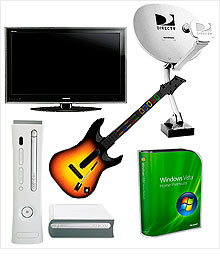Dolby's sweet sound
Demand for the company's audio technologies has been rocking along with sales of electronic devices and the digitization of broadcasting.
 |
| Some of the products that use Dolby technology |
(Fortune Magazine) -- Cellphones, iPods, Xbox 360 shooter games - the world has grown noisier since 1965, when Dolby Laboratories, No. 82 on Fortune's 2008 list of Fastest-Growing Companies, first got into the business of making things sound better. So it's fitting that a company that pioneered noise-reduction in stereos and swaddled moviegoers in surround sound has flourished with the explosion of consumer electronics. But with gadgets and TVs threatened by the torpid economy, can it continue its scorching growth?
Dolby (DLB) has amassed a premier portfolio of technologies for the production, distribution, and playback of sound over a wide range of media. By winning over professionals, its software has become the de facto standard in the music, movie, and TV industries. Some of its formats have even become mandated standards - Dolby Digital, for instance, has to be included in all DVD and Blu-ray disc players. That, in turn, has generated name recognition and consumer demand for its technology.
Such broad acceptance gives Dolby a big advantage, since the costs of switching to alternative formats can be prohibitive. "Once it's on the platform, it's there to stay," says J.P. Morgan analyst Paul Coster. "You can't put the genie back in the bottle and proceed without Dolby, because then you strand potentially millions of consumers in a world without multichannel sound."
Most of the company's revenue now comes from licensing its technology to electronics manufacturers and software makers, which in turn pay royalties for every device that incorporates Dolby technologies. It's a highly profitable model, with gross margins hovering at 95%. Revenues have risen at an average annual growth rate of 24% over the past five years, to $640 million for the fiscal year that ended in September, while net income has increased by 45% per year. Even as sales of DVD players have declined as that market matures, Dolby has been able to replace those royalties with licensing revenue from PCs, getting a particularly big boost when Microsoft (MSFT, Fortune 500) included Dolby software in two versions of Vista.
Still, the pullback in consumer spending is forcing Dolby to shift out of hypergrowth mode. And there's little reason for shares to climb in the near future. "Dolby can only grow as fast as the consumer electronics market, and specifically the devices that need their technology," says Morningstar analyst Michael Holt. The company is projecting smaller revenue and earnings increases for 2009.
Even so, the stock has held up relatively well - falling just 16% since last May, vs. a 36% drop in the S&P 500 index - and the company beat analysts' estimates, with earnings up 41% year over year for the first two quarters of 2009.
Meanwhile, analysts are looking to growth opportunities in 2010 and beyond. For one thing, Dolby will get a lift next year with the release of Windows 7, which will feature its DVD playback software. Dolby has also begun to benefit from the worldwide transition from terrestrial to digital television over the next few years. Its audio-compression technology has already been incorporated into national broadcast standards in the U.S., Britain, France, Italy, Spain, and South Korea. As those countries switch to a digital signal, local TVs and converter boxes will have to include Dolby software, generating a new stream of royalties for the company.
Perhaps an even bigger opportunity lies in the rising demand for media players on mobile handsets, which could greatly expand Dolby's reach by hitching its technology to one of the most widely used consumer devices. "I think what happens over the next three years is that every cellphone in the world will come with an MP3 player, so Dolby will sell a chip for the billion or more cellphones that are sold every year," says Michael Kagan, who manages the Legg Mason Partners Equity fund and has owned Dolby since its IPO in 2005. "Even with a small license fee, that's a lot of money, and it does move the needle for them."
The larger Dolby gets, and the more ubiquitous its technologies, of course, the harder it is to maintain a breakneck growth rate. But in the sort of economy in which companies are thrilled to break even, having a growth rate - of any size - sounds pretty sweet. ![]()
-
 The retail giant tops the Fortune 500 for the second year in a row. Who else made the list? More
The retail giant tops the Fortune 500 for the second year in a row. Who else made the list? More -
 This group of companies is all about social networking to connect with their customers. More
This group of companies is all about social networking to connect with their customers. More -
 The fight over the cholesterol medication is keeping a generic version from hitting the market. More
The fight over the cholesterol medication is keeping a generic version from hitting the market. More -
 Bin Laden may be dead, but the terrorist group he led doesn't need his money. More
Bin Laden may be dead, but the terrorist group he led doesn't need his money. More -
 U.S. real estate might be a mess, but in other parts of the world, home prices are jumping. More
U.S. real estate might be a mess, but in other parts of the world, home prices are jumping. More -
 Libya's output is a fraction of global production, but it's crucial to the nation's economy. More
Libya's output is a fraction of global production, but it's crucial to the nation's economy. More -
 Once rates start to rise, things could get ugly fast for our neighbors to the north. More
Once rates start to rise, things could get ugly fast for our neighbors to the north. More







